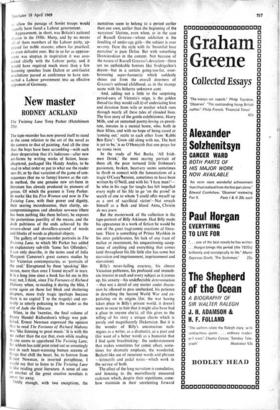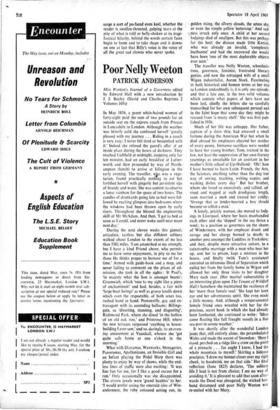New master
RODNEY ACKLAND
The tape-recorder has now proved itself to stand in the same relation to the art of the novel as the camera to that of painting. And all the time that the boys have been scrambling—with such sheer desperation that it's ludicrous—after new art-forms by writing works of fiction, loose- chaptered, packaged like Handy Andies, to be read in what order or put to what use the reader sees fit; or by that variation of the game of con- 'sequences (but no so funny) known as the cut- in method, the one genuine new art-form in literature has already produced its pioneers of genius. Of which the greatest is Tony Parker. In works' like his Five Women and now in The Twisting Lane, with their power and dignity, their searing incandescence, their clarity, un- compromisingness and absolute newness (there has been nothing like them before), he exposes the pretentious puerility of the means, and the drab paltriness of the ends achieved by the tossers-about and shovelers-around of words and blocks of words as physical objects.
The gallery of tape-recorder portraits in The Twisting, Lane, to which Mr Parker has added an explanatory sub-title `Some Sex Offenders,' I can only describe, in the terms used of Julia Margaret Cameron's great camera studies by her Victorian contemporaries, as 'portraits of the soul' Enraptured by these 'speaking' like- nesses, more than once I found myself in tears. It is a long time since a book has hit me in this way; not, I think, since The Fortunes.of Richard Mahony when, re-reading it during the blitz, I came again on those last bleak and shattering chapters, more truly tragic (perhaps because there is no capital T to the tragedy) and cer- tainly as utterly poleaxing to the reader as the end of Jude the Obscure.
When, in the 'twenties, the final volume of Henry Handel Richardson's trilogy was pub- lished, Ernest Newman expressed the opinion . that to read The Fortunes of Richard Mahony was 'like listening to great music.' Ii is with the ear rather than the eye that, even while reading it, one seems to apprehend The. Twisting Lane, for seldom has cold print cried out so arrestingly and in such heart-warming human accents of things that chill the heart. So, to borrow from Ernest Newman, in inverted paraphrase, I would say that to listen to The Twisting Lane is like reading great literature. A sense of one or another of the great creative novelists is never far away. Oddly enough, with two exceptions, . the narratives seem to belong to a period earlier than our own, earlier than the beginning of the narrators' lifetime, even when, as in the case of Russell Greaves—whose addiction is the fondling of under-age girls—the subject is over seventy. Here the style with its 'beautiful bare narrative' is pure Defoe. But with something Dostoievskian in the content. Not because of the nature of Russell Greaves's deviation—there are no unthinkable horrors like Svidrigailov's dream—but in a certain going-too-far, over- brimming super-humanity which suddenly shines out from the overall dourness of Greaves's unloved childhood, as in the strange scene with his hitherto unknown aunt.
And, adding not a little to the surprising period-aura of Victoria's reign, is the golden thread (as they would call it) of undeviating love and devotion from wife or mother which runs through nearly all these tales of clouded lives. The love story of the gentle exhibitionist, Harry Mills, and an unnamed poetry-loving ex-prosti- tute, inmates in a mental home, who, both in their fifties, and with no hope of being cured or 'coming out,' recite to each other from 'Rabbi Ben Ezra': 'Grow old along with me, The best is yet to be,' is so O'Henryish that one prays for no ironic twist.
In the study of Nat Burke, 'All Irish- men Drink,' the most searing portrait of them all, the poor tortured little Irishman's passionate, broken, heart-cry seems sometimes to throb in concert with the lamentations of a tragic O'Casey'heroine, sometimes to have been written by O'Neill, and with his `I hate men '— he who in his rage for toughs has felt impelled every night of bis life to go 'on the prowl' in search of one to whom 'I could offer myself up as a sort of sacrificial victim'—Nat reveals himself as a flesh and blood Anna„ Christie de nos jours.
But the masterwork of the collection is the tape-portrait of Billy Atkinson. Had Billy made his appearance in a work of fiction he would be one of the great tragi-comic creations of litera- ture. There is something of Prince Myshkin in his utter guilelessness, his lack of any trace of malice or resentment, his unquestioning accep- tance of anything and everything that comes (and throughout his life little else has come but starvation and imprisonment, imprisonment and starvation).
Billy's never-failing courtesy, his almost Victorian politeness, his profound and immedi- ate interest in each and every subject as it comes up, his anxiety—his undeflectable determination —that not a detail of any matter under discus- sion be allowed to pass unchecked, his patience in describing the Second World War and ex- patiating on its origins (for, the war having taken place in Billy's private world, it doesn't seem to occur to him that it might also have had a place in anyone else's), all this gives to the telling of his story a unique charm which is purely and magnificently Dickensian. But it is the wonder of Billy's unconscious tech- niques as a writer, as a dramatist, as a poet and (for want of a better word) as a humorist that I find quite breathtaking : the understatement that makes sometimes for comic effect, some- times for dramatic emphasis, the wonderful, Beckett-like use of recurrent words and phrases —leitmotifs and pedal notes—which work in the service of both.
The effect of the long narration is cumulative, and listening to the marvellously measured cadences which, despite their repetitions, some- how maintain in their unrelenting forward surge a sort of po-faced even keel, whether the reader is swollen-throated, gulping tears at the pity of what is told or belly-shaken at its tragi- farcical hilarity, behind the words certain faces begin to loom and to take shape and it dawns on one at last that Billy's voice is the voice of all the great sad clowns who never spoke.











































 Previous page
Previous page